Dwight Longenecker's Blog, page 303
February 13, 2012
Finding Forgiveness
This piece was first published over at Integrated Catholic Life. A reader has asked for it to be published here too. If you like it please share.
"I know I have been forgiven because I've been to confession, but I don't feel forgiven!How can I find peace and know that I'm forgiven? "
This is one of the most frequent questions I get as a priest. A similar question comes up with the problem of forgiving others, "Father," the person asks, "my business partner screwed me real bad. I've tried to forgive him, and I've given it all to God, but I still feel resentment and bitterness. I still want revenge. How can I find peace?"
Assuming that you have already taken the sin to God in the sacrament of reconciliation, the first step to finding the peace of forgiveness is to remember the fact of forgiveness. If you have confessed and received absolution you are forgiven. It's a fact. The first step is to claim that fact. Make it an act of your will and intellect. You might even say out loud to yourself, "I am forgiven. It's a fact." Imagine that resentment, sin, guilt and anger being washed away by a tsunami of God's mercy.
The next step in finding forgiveness is to take the guilt, the memory, the nagging resentment and bitterness with you to Mass and offer it up.There are various practical ways of doing this.
First of all you need to ask yourself what Mass is actually for. What's the purpose of Mass? Many Catholics have never asked that basic question, and if pressed they might say, "It is a chance to worship God together." or "We come together to sing hymns, praise God and listen to his word and receive the Bread of Life." or "Mass is the gathering place of the people of God around his Word and his table."
What's missing is the idea that Mass is a sacrifice. It is an offering. From the beginning of religious instinct in man the action of worship was the action of sacrifice. Humans offered to God the best gifts they had. However, in the Jewish religion this idea was expanded and the sacrifice also became a sin offering. The effect of sin was death, but the person's sins were projected on to the animal which was sacrificed, and so the sins were forgiven. The price had been paid.
This primitive idea still lives within the idea of sacrifice of the Mass. The primary meaning of the Mass is that it is an offering of Christ's once for all sacrifice, and that this offering applies the benefits of Christ's sacrifice to our lives. Christ's death was the payment for our sin. Once we see that the Mass is a sacrifice we can participate in the action of the Mass in a new and deeper way.
Therefore, when you come to Mass with a burden of guilt or a nagging desire for revenge or a sense of resentment and anger, you should bring that as part of your offering. See every part of the Mass as part of a greater offering to God.
When you say the confession at the beginning of Mass imagine those resentments, that guilt and that feeling of not being forgiven gathered up into the prayer. When the collection is taken, don't just put money in the basket--imagine that you are putting your negative feelings in the basket too. When the offertory gifts are brought forward in procession imagine that the person you resent is being brought forward and offered to God. Place all your dark feelings into those gifts being brought forward. Give God your frustration and fear and worry and anxiety. As the priest lifts the bread and wine see him lifting all the unresolved negative emotions to God.
In the action of the Mass the bread is taken, blessed, broken and transformed. So it is with the negative feelings that you offer up. Through the priest God will take them, offer them to God, bless them, break them and then they will be transformed.
To get rid of those negative feelings of not being forgiven see that first of all the priest takes them as you offer them up. Standing in the place of Christ the priest symbolically takes your burdens. As he does, think of Christ Jesus himself saying, "Come to me all who labor and are heavily burdened and I will give you rest." Through the action of the Mass Christ will take those burdens.
When I say Mass I make a conscious act of the will to bring to the altar all the sins I have heard in the confessional. Of course I don't remember the individual sins. Instead, in a moment of silent prayer I ask that God will take them and forgive them and remember them no more, and that the penitent will be set free, forgiven and healed.
Then the priest blesses the bread. Imagine that he is blessing the burdens you have. "Bless the burdens?" Yes, the dark times of our life will become blessings as they are transformed by grace. But first, like the bread, they need to be broken. The dark feelings have you in bondage, and as the bread is broken see the bonds being broken. Then the transformation of the bondage into blessing will be completed.
Finally, as you receive the body of Christ imagine that you are receiving in the most powerful way the peace and strength and knowledge of forgiveness from Christ himself.
This "liturgy therapy" might take some time to sink in. If your mind has been circling around and around over particular grievances it is possible that you have got into a destructive mental pattern. This negative downward spiral can only be reversed and countered by repeated positive cycles of receiving God's forgiveness week by week.
I am convinced that faith works. In other words, our Catholic faith really does bring us to an abundant life--a life that is transformed from the inside out by God's grace.
Our part is to come to God with an open heart, an open mind and an active will so that as we co operate with his grace we will be transformed into his likeness.
Published on February 13, 2012 07:21
Installation Mass
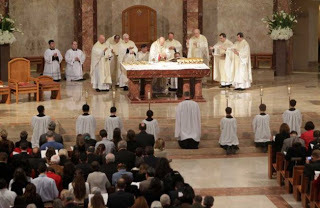
Concelebrated Mass in pro Cathedral
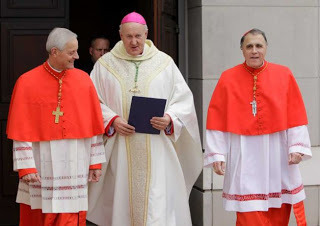
Msgr Steenson, Cardinals Wuerul and diNardo
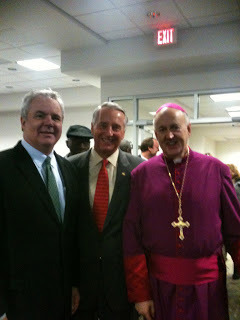
Marcus Grodi and Msgr.Steenson
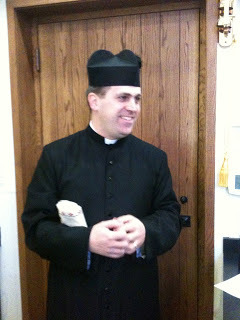
Fr Eric Bergman of St Thomas More, Scranton
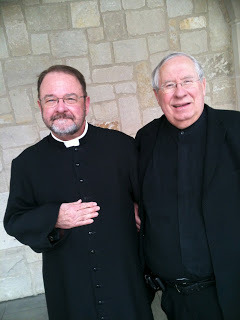
Fr Ramsey and Rev.Dn Barnett from Our Lady of Walsingham
Published on February 13, 2012 07:14
Installation of Msgr. Steenson
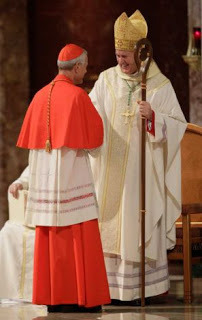
Newly installed Ordinary Steenson greets Cardinal Wuerl
It was an amazingly historic day yesterday in Houston, Texas. I was present for the inaugural Mass for Msgr. Jeffrey Steenson as the first ordinary of the Ordinariate of the Chair of St Peter.
It was a time to meet old friends and make new friends, and always a great chance to meet readers of this blog. It was very moving to see the warm welcome given by the two cardinals--Wuerl and diNardo--to the new Ordinary. Mass was then celebrated according to the Anglican Use, and it was quite something to see two cardinals of the Catholic Church kneeling with us to recite the Prayer of Humble Access..."Lord we do not presume to come to this Thy table, trusting in our own goodness, but in Thy manifold and great mercies..."
Music was provided by combined choirs of the Catholic community in Houston led by the eminent organist and composer Dr. Kevin Clarke, himself a convert from Anglicanism--now an organist of St Theresa's, Sugarland. Among the classic pieces of English music was Byrd's Mass for Five Voices, Parry's great anthem, I Was Glad, O Sacrum convivium by Thomas Tallis, and Bl. Cardinal Newman's great hymn Praise to the Holiest in the Height.
Appropriately, for the establishment of the Ordinariate of the Chair of St Peter, the readings were the passage from Isaiah about the steward of the King, I Peter 5. 1-4, in which St Peter encourages his bishops to be 'fellow shepherds' and Matthew 16 on which Christ founds his church on Peter the Rock. Msgr. Steenson's homily was fitting with his status as a patristics scholar. He spoke on the controversy in the early church on the reception of those who had apostatized. The Pope was generous and made it as easy as possible for them to come back into full communion. That same generosity was seen in the warmth and humility of the Cardinals--representing the Holy Father--as the Ordinariate was established.
All in all, it was a most moving and historic day, and what a great privilege to be part of it.
Rocco Palmo reports here
Photogallery from Houston Chronicle here.
Msgr. Steenson's homily here.
Published on February 13, 2012 07:03
February 12, 2012
Jump Across
Jump across to Integrated Catholic Life for my latest article there--Finding Forgiveness. Practical advice on how to know and feel the forgiveness you have received in confession.
Over at Catholic Online I write on the Santorum surge. What does a "Santorum Catholic" look like, and what are some of the interesting revelations that Santorum's candidacy makes for Catholicism in America.
Check out The Anglo Catholic for my post on The Real Anglican Patrimony.
Over at Catholic Online I write on the Santorum surge. What does a "Santorum Catholic" look like, and what are some of the interesting revelations that Santorum's candidacy makes for Catholicism in America.
Check out The Anglo Catholic for my post on The Real Anglican Patrimony.
Published on February 12, 2012 04:44
February 11, 2012
Challenging Prayers
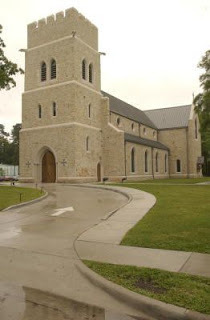
I'm off to Houston Texas to worship at Our Lady of Walsingham--which is a little piece of England in the heart of the Lone Star state. They're lovely people and they've built a lovely church, and if you ever want the English experience without the nuisance of crossing the Atlantic you can always visit the Shrine of Our Lady of Walsingham on Shadyvilla Lane in Houston.
In the meantime, while thinking of the damp lands and, I have to admit, feeling somewhat nostalgic for warm beer and cold food...I've happened on a new blog--a satirical look at life in England--especially the Church of England. I wonder if Humph might sign on as guest blogger... Go here if you're interested. The link was about a member of the Church of England General Synod who is unhappy that they begin their sessions with prayer. For those of you who find satire somewhat of a challenge, I should say that it is a joke.
What I love about the Ordinariate is that it is such an experiment. Who says the Catholic Church is stuck in the past, unable to change and dull? Suddenly this 84 year old Pope comes up with something truly original, and yet consistent with the traditions of the Church down the ages. I hope the Ordinariate is a roaring success, and will keep you posted about the people I meet in Houston.
Published on February 11, 2012 07:50
A Story from Lourdes
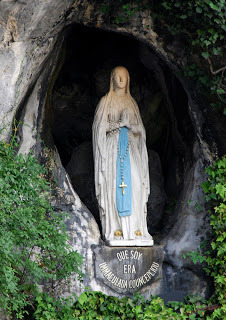
from The Catholic Thing
Mr. Clyde King, the steady sacristan at my parish here in northern California approached me one day after Mass last year, asking if perhaps I could fill in for him for about ten days. He might be going out of town, though this was not yet assured; he wanted to line someone up, with plenty of notice, just in case.
He was planning, or rather hoping, to go to Lourdes; he has been battling melanoma since 2009. He had had one surgery to remove a tumor from his left temple, and another one in late 2010 to remove three more tumors just beneath his jaw line. Aside from that procedure, which excised a portion of his neck along with the cancer, no one would have any reason to suspect he'd had a brush with a life-threatening illness. He looked sturdy and walked strong. His vigor was such that I was surprised to learn he was over sixty-five. And for the moment, all the melanoma had been removed.
Still, he put in an application to join an annual pilgrimage sponsored by the Knights of Malta, who take malades – pilgrims who are sick enough to qualify but well enough to travel. Not every applicant, of course, can be accommodated, and he was put on the waiting list. He responded with equanimity, saying simply that Mary will decide who ends up going.
Soon afterwards, the radiologist called and somberly informed him that a routine follow up PET scan revealed the presence of yet another and severe (stage 4 melanoma) tumor – this time in his chest, on the right side of his windpipe. Both surgery and treatment would be required.
With no knowledge of that dispiriting medical development, the pilgrimage organizers then notified him – approximately a week before the pilgrimage to Lourdes was set to begin – that a space had opened up. It was time to pack.
Go here to read the whole story...
Published on February 11, 2012 05:34
February 10, 2012
Clear Analysis of the Accomodation
Here is the clearest and simplest analysis of President Obama's so called 'accommodation' for religious groups.
Jimmy Akin thinks the new version is more evil than the first.
The Anchoress gathers reactions in her usual efficient digest.
Jimmy Akin thinks the new version is more evil than the first.
The Anchoress gathers reactions in her usual efficient digest.
Published on February 10, 2012 20:27
To Texas
I'm traveling to Texas tomorrow to attend the inaugural Mass of Fr Steenson as the first Ordinary of the Ordinariate of the Chair of St Peter. I'll be blogging and tweeting on the events if you'd like to follow.
Published on February 10, 2012 16:45
The Timing of Santorum's Surge
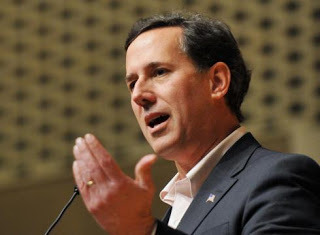
Now before anybody gets stroppy about my being political, I'm not supporting any body publicly for president, but as a Catholic priest, and a former Evangelical it is pretty interesting to observe the timing of Rick Santorum's surge, so I'm making religious observations on a Catholic who's running for President.
It's like he was waiting in the wings. The debates were all about the economy and foreign policy. Those were the big topics right? Santorum was just this anti abortion, home schooling, right wing guy who was sticking up for family values. He was a quaint hold over from a bygone age perhaps. Someone to be respected and ignored.
So the other fellows and the press start scrapping and he rises above it. He's not worth their notice. Then people seem to get tired of the scrapping and Santorum is waiting there to be noticed, and noticed he is.
Just at the same time he gets a huge boost from the social issues end of things. Komen de-funds Planned Parenthood. PP jumps on them and bullies them into retraction. The same week the Bishops rise up in an astounding surge of national leadership over the question of religious freedom. It's like the issues were tailor made for Santorum. Romney can't say much about it because his own healthcare plan provided similar cover. Gingrich can't talk much about family values with his history of philandering.
Furthermore, Santorum has been pretty smart. He's the only one who can play the 'Aw shucks, I'm just an ordinary boy from Main Street USA" card. People underestimate how powerful this is in the American imagination. Americans love the plain folks appeal. Virtually every President in modern times, apart from JFK and the first Bush, has presented his personal story in this way.
Combined with this, he is effectively uniting two formerly divided voting blocs: Evangelical Christians and blue collar Catholics. He is a unique mix--a guy with blue collar Catholic roots who knows and understands Evangelicals. If he doesn't claim the title "Evangelical Catholic" he could.
Santorum (whether he knows it or not) is riding a wave of some historic shifts in American Christianity. Evangelical Protestants have been historically distrustful of Catholics. For cultural and theological reasons Catholics and Protestants were worlds apart. However, for the last forty years the ecumenical movement has broken down some of the barriers. For the last ten years Evangelicals and Catholics have worked together, talked to each other and united on social issues. Evangelicals have come to accept Catholics as allies not enemies as they both stand against the common enemy--creeping atheistic secularism.
At the same time the Catholic Church has changed. American Catholicism used to be cultural Catholicism. For generations the Italians and Irish and Polish Catholics in the Northeastern cities were part of the establishment. They had hospitals and schools and convents and parishes and colleges. Their Bishops lived in grand residences in the suburbs and dined with the rich and powerful.
Evangelicals have always had a "persecuted minority" mentality--even when they weren't the persecuted minority. Now, for various reasons, the old cultural Catholic hierarchy is fading away. A new kind of Catholicism is emerging--what some call the JPII generation. These are not so much cultural Catholics as committed Catholics. They are fewer in number, but they are vibrant in their faith and don't care much for the old establishment. They're ready to embrace the "persecuted minority" identity with a certain astringent zeal.
As such they are suddenly perfect bedfellows with the Evangelicals. Santorum's surge can be put down to his success in appealing to both, formerly divided groups. He is capable of bringing together the old blue collar Catholics and the new Catholics and the Evangelicals. If he can pull that off--and so bring along the Catholic swing vote in the big swing states--and carry with him the Evangelical heartland of the midwest and South--he could not only win the nomination, but the White House.
Published on February 10, 2012 15:32
It's Not Nice to Fool Mother Church...
If you think it's health care, but it's not...it's the Mandate.
It's good the Bishops are going to go through Obama's "accommodation" carefully.
He fooled them once. He'll try it again.
He should learn, it's not nice to fool Mother Church...
Published on February 10, 2012 13:02
Dwight Longenecker's Blog
- Dwight Longenecker's profile
- 80 followers
Dwight Longenecker isn't a Goodreads Author
(yet),
but they
do have a blog,
so here are some recent posts imported from
their feed.



